Faces of Change: the Women Leading the Battle to Clean Sri Lanka’s Oceans
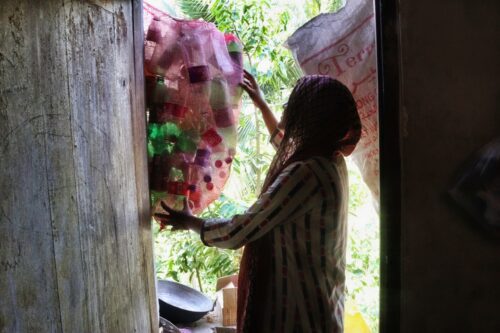
Barely concealed beneath Sri Lanka’s breathtaking beaches and vibrant marine life lies a looming crisis that threatens to destroy this pristine paradise. For many coastal communities, the ocean plastic pollution problem is endangering fragile natural ecosystems and jeopardizing their livelihoods and health. Against this backdrop, local women have emerged as a beacon of hope. Through their work with the United States Agency for International Development’s Ocean Plastics Reduction Activity, women in Sri Lanka are making changes to turn the tide on ocean plastics pollution and improve the lives of their families.
Despite Sri Lanka’s low overall recycling rate (4% for all plastics) a new partnership between USAID, Ceylon Cold Stores (CCS) PLC—known for its beloved Elephant House ice cream and beverages—and Viridis Pvt Ltd, the country’s second-largest recycling exporter that specializes in polyethylene terephthalate (PET) flakes, promises a better future for the country. These companies, together with local organizations, have established one of the first formally recognized women-driven recyclable collection networks. This initiative helped establish Material Recovery Facilities, including one already operational in Dickwella in Sri Lanka’s south. Along with this facility, similar networks in Batticaloa, Trincomalee, and Mannar are collectively processing about 30 tons of plastic each month. While the benefits to the environment are clear, the impact on the community is beginning to show. By compensating women based on the quantity of the plastics they collect, they are able to better support their family.
But who are these women? Let’s meet a few:
In the bustling town of Batticaloa in eastern Sri Lanka, Rohini Dharshan leveraged this work to transform her family’s life. Rohini, a member of a local community-based organization, Kaviya Self-Development Women’s Center, paid off her sister’s debts using the money she earned from collecting recyclable plastics. “I used to see waste all around; now, I see opportunity,” said Rohini.
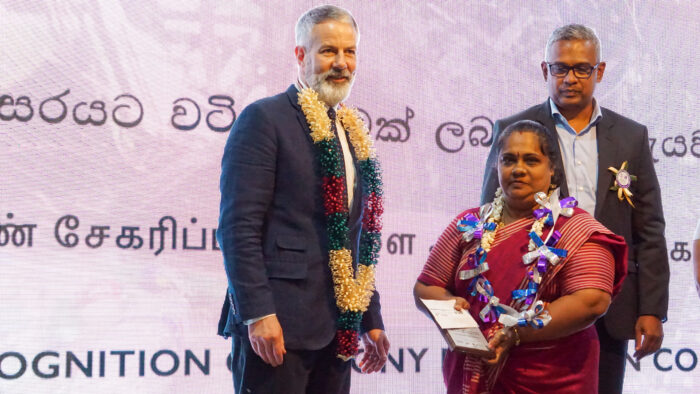
Further south in Dickwella, Shanthi Jayaweera worked with the Soba Kantha Environmental Management and Community Development Foundation to turn plastic collection into a lifeline. After an accident left her husband disabled, Shanthi shouldered the economic responsibility of the family. In three months, she collected 20,000 plastic bottles, converting them into US $82 (25,000 Sri Lankan rupees). “I’m a fighter,” Shanthi declared proudly, “I support my family with what many discard without a second thought.” Her efforts are concentrated around Hiriketiya Bay, a tourist favorite, where she has created partnerships with local businesses to collect their previously discarded plastic waste. Her collection bag was her constant companion as she moved through her community.
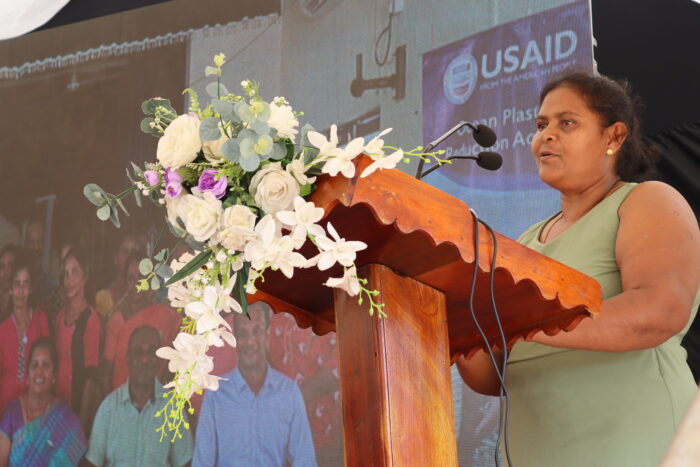
Not far from Shanthi in the southern province of Sri Lanka lies the town of Devinuwara, home to Sudarshani. Sudarshani is a mother of three children, who found a new beginning in this work. Her husband’s meager earnings from fishing barely sustained their family, and the plastic littering their shores was only a sobering reminder of environmental neglect. Following the project’s training, Sudarshani now collects and sells recyclable plastics, boosting her family’s income. “Picking up plastic has changed my life,” she says.
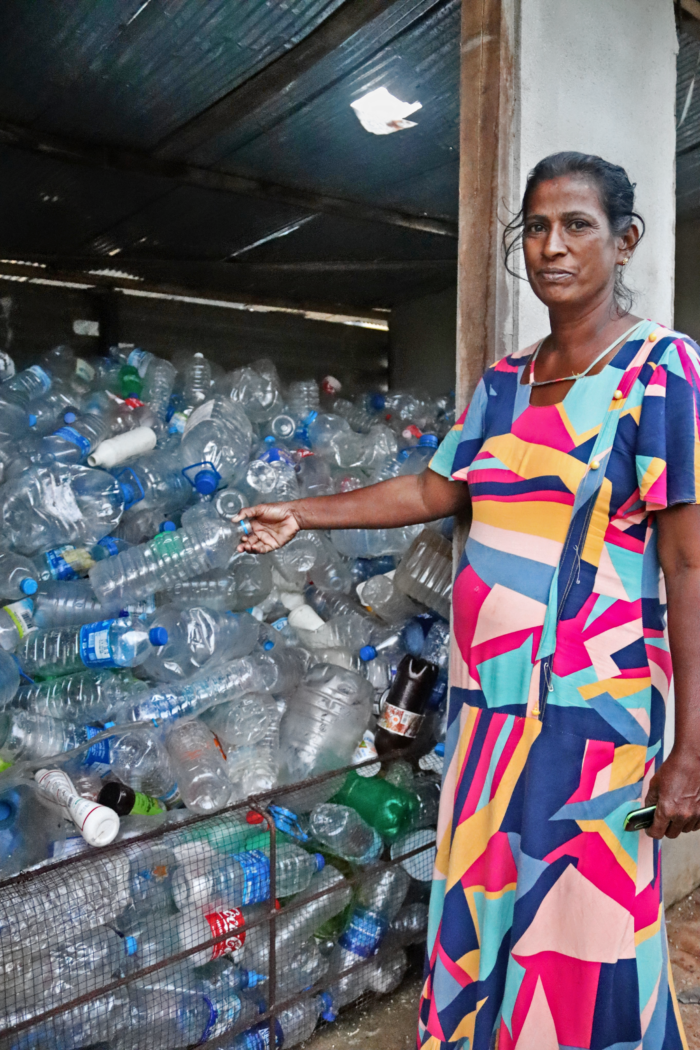
East in the town of Trincomalee, Pathmini Sasikumar combines her role as a preschool teacher with a plastic waste collector. Pathmini also uses her position as a teacher to influence the next generation. “Being a teacher and a collector, I have the platform to lead by example. My students see me collect and understand the importance of preserving our environment,” she shares. “Every lesson on waste I give my students is a lesson in hope for our planet.”
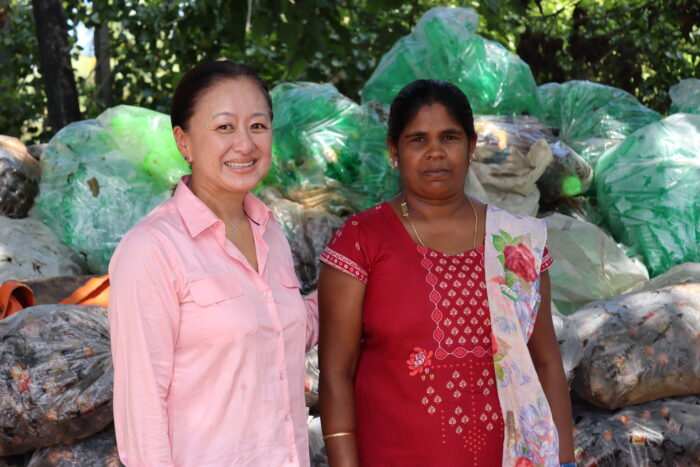
Since the beginning of the project in late 2022, 100 women from coastal provinces have gathered over 13.9 metric tons of plastic waste (equal to the weight of 14 standard cars), dramatically reducing pollution both in local waters and beyond. These efforts are alleviating environmental stress and transforming public perception of plastic waste – from that of a persistent pollutant, to a pathway for prosperity.
If this work is to be enduring, it can’t end with collection. Once gathered, Viridis Recycling ensures the materials are transformed into PET flakes, which are then repurposed into brooms, brushes, threads, and other useful products. USAID understands that to complete the task of collecting plastic products, these women often require support in unique ways. To address the challenges of collecting waste in rural and hard-to-reach areas, the project introduced an innovative solution: the first electric bikes (e-bikes) in Sri Lanka designed specifically for plastic collection. Manufactured by a local enterprise, Lumala Bikes, and funded by Ceylon Cold Stores PLC, these e-bikes transformed the collection process by allowing women to cover larger areas with less effort. They are increasing both the scope and impact of their work, without leaving a carbon footprint.
The long-term success of this initiative will hinge on strategic partnerships. Gunadamin Elephant House, the corporate social responsibility arm of Ceylon Cold Stores PLC, has embraced this work as a chance to fulfill their commitments. Meanwhile, a partnership with Viridis Pvt Ltd guarantees a consistent supply of PET materials for recycling. Local community-based organizations have also played a crucial role in mobilizing women and managing logistics, thus establishing a locally driven model where participants are compensated for their efforts and incentivized to continue.
Successfully launched in three of Sri Lanka’s five coastal provinces, this women-led plastic waste collection network plans to expand to 11 more strategic locations. This success is an example of the circular economy model, where resources are not only used but are recovered and regenerated sustainably.
The success of the USAID Ocean Plastics Reduction Activity provides a model that could be replicated throughout Sri Lanka and the world to address similar environmental challenges. By linking environmental stewardship with economic benefits, local empowerment, and strategic partnerships, USAID is demonstrating how to tackle global problems at the local level. Global change starts with individual acts. Join us in celebrating these remarkable women and the blueprint for a better tomorrow that they’re creating in Sri Lanka.

